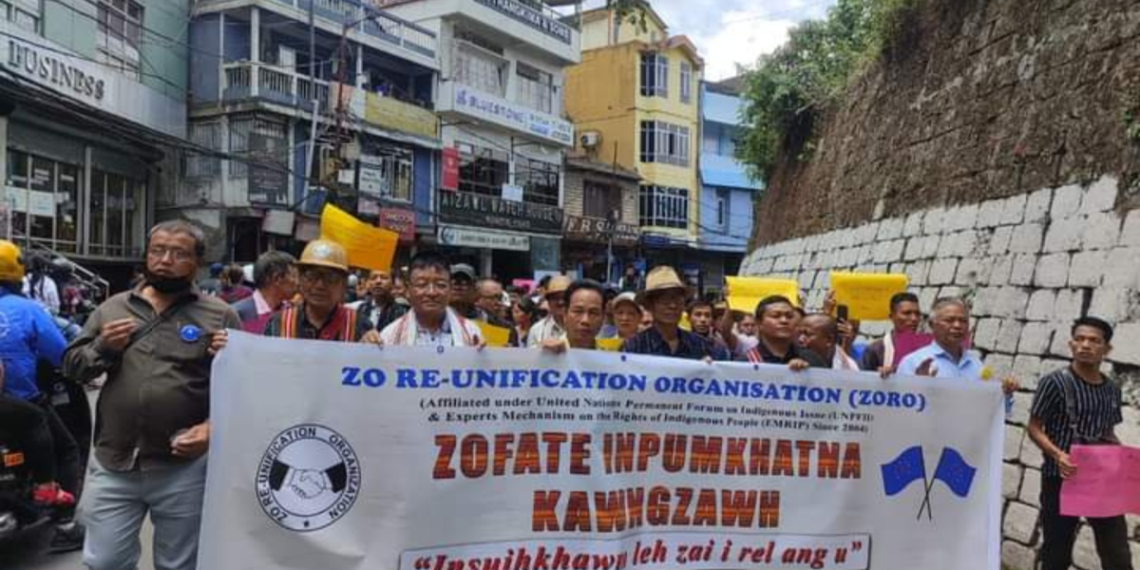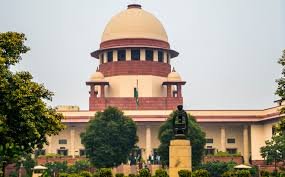Protests Erupt as Mizoram and Manipur Fight Against Border Fencing and FMR Abolition
Ethnic organizations like ZORO and the Kuki-Zo community rally in opposition to the Indian government’s proposed border fencing and the removal of the Free Movement Regime. The widespread protests are sparking a political crisis across the Indo-Myanmar border.
BY PC Bureau
A wave of opposition to the Modi government’s proposed border fencing and the abolition of the Free Movement Regime (FMR) is sweeping across multiple ethnic communities, signaling a growing political flashpoint. On Tuesday, the Zo-Reunification Organization (ZORO), which advocates for the unity of the Zo ethnic tribes, led a massive protest in Mizoram against the proposals. \
The protest, marked by symbolic acts such as burning copies of the controversial government order, took place in Aizawl and several district headquarters, including Champhai, Lunglei, Kolasib, and Serchhip. The protest also spread to the towns of Mimbung and Vaphai, as well as districts in Manipur, including Tengnoupal and Chandel.
The FMR, which allowed residents along the Indo-Myanmar border to travel up to 16 km across the border without a visa, has long facilitated cultural, familial, and trade ties among the Zo ethnic tribes. However, the new regulation, which introduces a stricter border pass system, is seen as an infringement on the rights and mobility of the Zo people. The Indian government has also pushed for border fencing, which has met with widespread opposition in Mizoram.
Who is against fencing the Indo-Myanmar border?pic.twitter.com/imjoTharkm
According to them, the British divided them and never consulted them when they were merged with India. This is not a proscribed insurgent group talking, but the Chief Minister of Mizoram.@PrinceArihan I…— MeiteiGrit (@MeiteiGrit) January 29, 2025
ZORO’s vice president, Rohmingthanga Kawlni, voiced strong criticism of both the Central government’s decision and the Mizoram state government’s endorsement, stating, “We are saddened and disappointed by the decision to sever communication with our brothers and sisters across the border. We call on the government to reinstate the FMR and halt the border fencing project.”
In response to the ongoing protests, ZORO has vowed to join forces with the Mizo Zirlai Pawl (MZP), a powerful student organization, to urge the Central government to reverse its decisions. They are determined to protect the cultural and historical ties that bind the Zo tribes across India and Myanmar.
Who is against fencing the Indo-Myanmar border?pic.twitter.com/imjoTharkm
According to them, the British divided them and never consulted them when they were merged with India. This is not a proscribed insurgent group talking, but the Chief Minister of Mizoram.@PrinceArihan I…— MeiteiGrit (@MeiteiGrit) January 29, 2025
Concerns Over Forced Repudiation of Refugees
Beyond the border fencing and FMR issues, ZORO has raised concerns about the alleged forced repatriation of 28 Bangladeshi refugees by the Mizoram government and the Assam Rifles. These refugees, who had sought shelter in Mizoram, were reportedly sent back under disputed circumstances. ZORO condemned this action, reiterating Mizoram’s historical role in providing refuge to persecuted minorities from neighboring countries.
ALSO READ: Kukis Protest, Nagas Warn, and ZORO Plans Showdown on Border Fencing
United Opposition to Border Fencing by Kuki-Zo and Naga Communities
The border fencing issue has also sparked intense protests in Chandel district, Manipur. On Republic Day, the Kuki-Zo community staged a rally to reject the proposed Indo-Myanmar border fencing, organized by the Kuki Chief Association (KCA) Chandel, Committee on Indo-Myanmar Border Fencing, KSO Chandel, and the Kuki Inpi Chandel. Protesters marched from Molcham village to the Assam Rifles camp, carrying placards against the fencing, citing its adverse impact on cross-border communities.
At the same time, the United Naga Council (UNC) issued a strong directive to Naga villages along the border, urging them to resist any border fencing activities. The UNC has condemned the fencing project, viewing it as an attempt to divide and alienate the Naga people from their ancestral lands. The council warned that anyone collaborating with authorities on the fencing project would face repercussions, stressing that the fencing serves the interests of colonial powers rather than indigenous border communities.
Escalating Opposition and Unity Across Communities
The growing resistance against the border fencing project has united the Kuki-Zo, Naga, and Mizo communities. The groups argue that the fencing will disrupt their historical ties, isolate border communities, and damage the socio-cultural and economic connections that have existed for generations. As the protests intensify, this issue is rapidly becoming a major flashpoint between ethnic groups and the Central government, potentially impacting the region’s political landscape for months to come.
In the face of increasing opposition, the future of the border fencing project and the status of the FMR remain uncertain, as communities continue to rally for their rights and the preservation of their cultural heritage.














